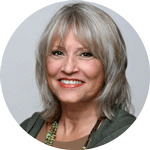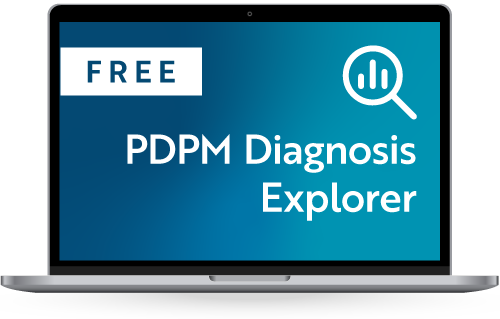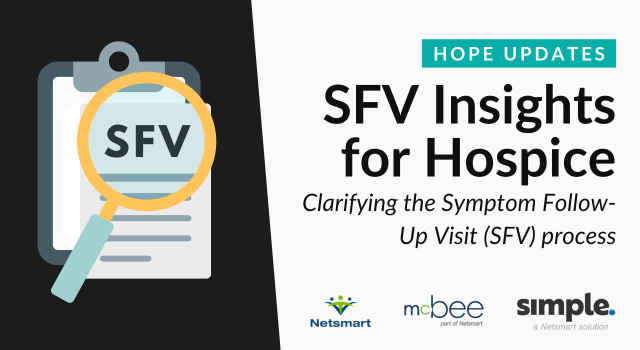Do you have questions about the new Symptom Follow-Up Visit (SFV)? You’re in the right place.
CMS has introduced significant updates to the Hospice Quality Reporting Program (HQRP) with the release of the Hospice Outcomes and Patient Evaluation (HOPE) tool. Among these updates is the Symptom Follow-up Visit (SFV), a critical component aimed at enhancing patient care by ensuring timely reassessment and management of symptoms.
The SFV has been the subject of many questions and discussions over the past few weeks, so we wanted to help demystify this topic. Whether you're a hospice care provider, administrator, or caregiver, understanding these changes is essential for compliance and quality outcomes.
Here are some important clarifications:
1. Hospices Have Discretion in SFV Completion
Hospices have the flexibility to determine who completes the SFV. It’s not a standalone instrument but a part of ongoing care designed to address symptoms like pain and other non-pain issues that impact a patient’s daily life—whether that be activities, sleep, relationships, or more. CMS has confirmed that the SFV can be completed by RNs as well as LPNs/LVNs, giving hospices the flexibility to use their discretion based on available staff.
2. SFV is Part of the Admission and HUV Instruments
The SFV is not a separate assessment tool. Instead, the HOPE items related to the SFV are integrated within the Admission and HUV instruments. This means, for example, that an RN may complete the HUV, and then another RN, LVN, or LPN can follow up by completing the SFV and documenting their findings on the HUV.
3. CMS Clarification
In an email sent on January 23rd, CMS confirmed that there is no separate SFV instrument. When an SFV is necessary, items J2052, J2053, and Z0350 (Date Assessment Was Completed) should be completed as part of the Admission and/or HUV visit, as applicable. The process for submitting the SFV will depend on the capabilities of the Electronic Health Record (EHR) vendor.
We hope this helps you better understand the SFV process and feel more confident as we approach the implementation of HOPE. If posts like this one are helping you prepare for October 1, you can subscribe to our blog here: Subscribe to Simple updates
Stay tuned for more updates on the HOPE tool and CMS communications. You can read more about HOPE on the CMS website here: HOPE Information and Resources
Thank you for your continued dedication to providing excellent hospice care.
Authors

Lisa Selman-Holman JD, BSN, RN, HCS-D, COS-C
Vice President, Clinical Services — McBee
Lisa Selman-Holman is the VP of Clinical Services at McBee, bringing over 39 years of expertise in home health and hospice. As a registered nurse and home care attorney, she specializes in regulatory compliance. Lisa has held various roles, from field nurse to executive, managing accreditation surveys, acquisitions, and regulatory crises. In 2004, she founded Selman-Holman & Associates, offering consulting, coding and OASIS review services. Lisa is a renowned educator, known for turning challenges into achievements. Joining McBee in 2021, she acts as VP of Clinical Services. In this role, Lisa oversees the clinical aspects of consulting projects, providing expert advice on clinical operations, quality improvement, patient care standards, and regulatory compliance to healthcare organizations, while also playing a key role in business development by identifying potential clients and shaping consulting proposals based on their clinical needs.
Click here to learn more about Post-Acute Academy from McBee.

Michelle Horner BSN, RN, HCS-D, HCS-O, HCS-H, COS-C
Clinical Consulting & Education Manager — McBee
With more than 30 years of diverse healthcare experience, Michelle Horner is a distinguished expert in home health and hospice. In her role as Manager of Clinical Consulting & Education at McBee, she specializes in Quality, Clinical, and Regulatory Consulting and Education, creating and delivering innovative, customized training programs that empower clients and elevate standards of care. Michelle shares her insights at various home care associations, captivating audiences with her knowledge and passion. She is also an active member of the AHCC’s Board of Medical Specialty Coding and Compliance Certification HCS-D and HCS-O Committees, contributing her expertise to shape industry standards.
Renowned for her ability to drive impactful financial and clinical outcomes, Michelle is committed to enhancing the quality of care in the home care sector, making a lasting difference for both providers and patients alike.
Click here to learn more about Post-Acute Academy from McBee.




